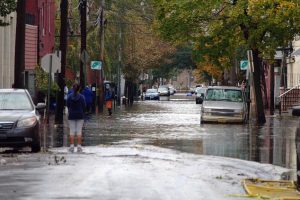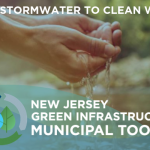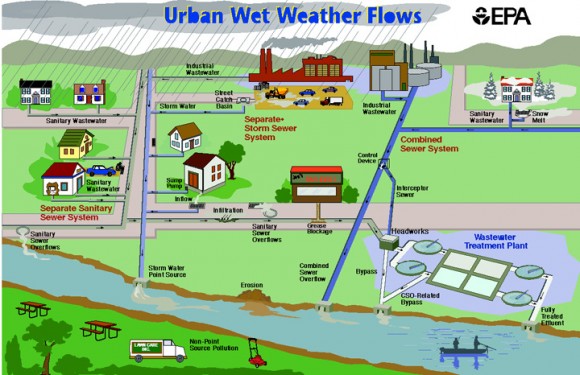New Jersey Future Blog
DEP Moves to Require Green Infrastructure for Stormwater Management
December 6th, 2018 by Louise Wilson
Update Jan. 8, 2019: Read New Jersey Future’s initial comments on the proposed rule.
The impacts of climate change, especially heavier storms and longer dry spells, are contributing to water pollution and flooding and in general making stormwater management — the art and science of managing and routing heavy rainfall — ever more challenging. And the state’s rules governing stormwater management have been robustly criticized for years by various stakeholders including developers, municipalities and environmental advocates, who view the rules as confusing, unenforceable and inadequate.
So it was good to see the New Jersey Department of Environmental Protection (DEP) announce it is proposing significant changes to the state’s stormwater management rules (NJAC 7:8). Notice of these changes was published in the New Jersey Register on the same day. The publication of these rule changes, or amendments, marks a major milestone in a years-long effort, including many stakeholder meetings, to update and improve the stormwater management rules.
Arguably the most important proposed amendment will replace the current requirement that major developments incorporate non-structural stormwater management strategies to the “maximum extent practicable” to meet stormwater management standards for water quality, recharge and volume control, with a requirement that green infrastructure must be utilized to meet these standards. GI will not replace traditional “gray” infrastructure, but will complement it by playing the lead role in managing the first inch or two of rain.
The problem with the current “maximum extent practicable” standard is that it’s subjective. It can be (and often is) interpreted differently by different reviewing authorities, causing confusion and delays. Meanwhile, as noted above, pollution and flooding caused by stormwater have worsened.
This proposed rule change signals a paradigm shift. Making green infrastructure a required strategy and providing appropriate “credit” for its infiltration properties will bring fundamental changes to the way public- and private-sector stormwater management systems are designed, constructed and maintained. Education and training for decision makers and practitioners will be imperative. More on that in a future blog post!
With Monday’s announcement, the clock started ticking on a 60-day comment period. DEP will hold a public hearing on January 8 and all comments are due by February 1. Details about the public hearing and comments, which may be submitted in writing or via an online form, can be found in DEP’s announcement.
New Jersey Future will submit comments and take a formal position on the rule amendments after a careful review and dialogue with colleagues and partners. But DEP’s emphasis on objective standards and green infrastructure is both promising and refreshing. By reducing or even eliminating polluted runoff, green infrastructure techniques prevent water pollution, replenish groundwater, reduce flooding, take pressure off of aging or undersized drainage pipes, sustain healthy urban ecosystems, cool and clean the air, and sometimes capture rainfall for beneficial reuse such as irrigation. Requiring green infrastructure as first-choice stormwater management techniques is key to moving this suite of stormwater management options from the margins to the mainstream.

















